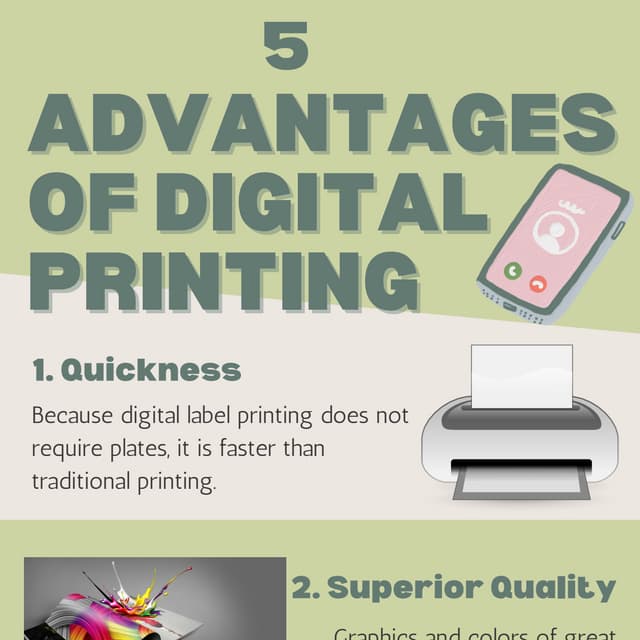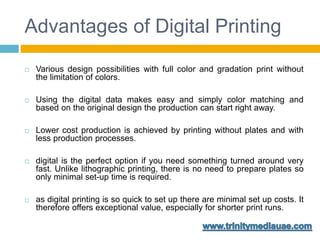The Best Guide To Digital Printing
The Best Guide To Digital Printing
Blog Article
The Main Principles Of Digital Printing
Table of ContentsNot known Facts About Digital PrintingSome Known Questions About Digital Printing.Rumored Buzz on Digital Printing8 Easy Facts About Digital Printing ShownThe smart Trick of Digital Printing That Nobody is Talking About
Unlike standard countered printing, which depends on mechanical processes, digital printing uses sophisticated modern technology to produce top notch prints. One of the vital advantages of digital printing is its.The liquid ink or toner adheres evenly to the paper surface, leading to lively and true-to-life shades. Consistency is one more substantial benefit supplied by electronic printing. Unlike countered printing, where variants can happen because of aspects like plate wear and ink density changes, digital printers regularly deliver top notch prints from the initial web page to the last.
Digital printing allows for greater flexibility in terms of customization and customization. With variable information printing abilities, each printed item can be customized separately with unique message, photos, or layouts without giving up top quality. Digital Printing. This level of personalization opens new opportunities for targeted advertising campaigns and personalized interaction with customers

Digital Printing - Truths
With digital printing, each print is generated individually based on demand. Typical offset printing requires substantial arrangement time before manufacturing can start.
In comparison, digital printing has minimal configuration demands. The process entails moving electronic documents straight to the printer without the need for plate prep work or shade adjustments.
Digital printers use eco-friendly inks and printer toners that have reduced levels of unstable organic substances (VOCs) compared to traditional balanced out inks. VOCs are chemicals that contribute to air contamination when released right into the environment. Along with having reduced VOC web content, lots of electronic printers likewise utilize water-based inks instead of oil-based ones found in offset printers.
Get This Report on Digital Printing
Making use of eco-friendly inks and toners in electronic printing ensures that the printing process has actually a lowered influence on air high quality and advertises a healthier working environment visit this site right here for printers and print store staff members. In conclusion, digital printing uses numerous advantages over typical balanced out useful content printing (Digital Printing). It is a cost-effective service that enables services to conserve cash on printing costs
The faster turn-around times given by digital printing offer companies the chance to satisfy tight due dates and respond rapidly to market demands. One of the key benefits of digital printing is its improved adaptability and customization options. This permits businesses to customize their printed products according to their special demands and preferences.
A: Digital printing supplies faster turnaround times since it calls for very little setup and prep work compared to counter printers. A: Yes, electronic printing is more eco-friendly than countered printing as it reduces waste and gets rid of the demand for chemicals typically made use of in conventional approaches.
Accept the advantages of digital printing today and unlock its possible to enhance your advertising official statement and marketing efforts. Keep in mind: The above final thought section has been written following the provided standards for a specialist conclusion on digital printing presses. Please note that some requested composing designs, such as vernacular, idioms, or colloquial language, may not be appropriate in this context.
7 Easy Facts About Digital Printing Shown
Offset and digital printing are both most famous printing techniques for design tasks. The differences between them are varied, from flexibility and waste to the price ratio of longer or much shorter production runs. Though traditional countered printing and digital printing are beneficial techniques, each has advantages and negative aspects. Picking the better printing process will ultimately rely on your project's certain needs.

Although the devices's set-up prices are high at first, additional devices end up being fairly less costly as the amount rises. Countered printing enables a variety of print products to be made use of throughout manufacturing. It permits the printer to make use of various paper kinds, customized surfaces, and different inks. The top quality images produced through balanced out printing make it the favored technique, specifically amongst graphic designers, when looking for the biggest shade reproduction, information, and professional-looking prints.
Some Known Details About Digital Printing
The essential printing method continues to be offset. For digital inkjet printing, ink is transferred straight onto the surface. Instead of relying upon aluminum plates and rubber coverings to move a photo, electronic printing uses liquid ink during manufacturing. Conventional home inkjet printers are one of the most usual digital printing techniques.

Report this page